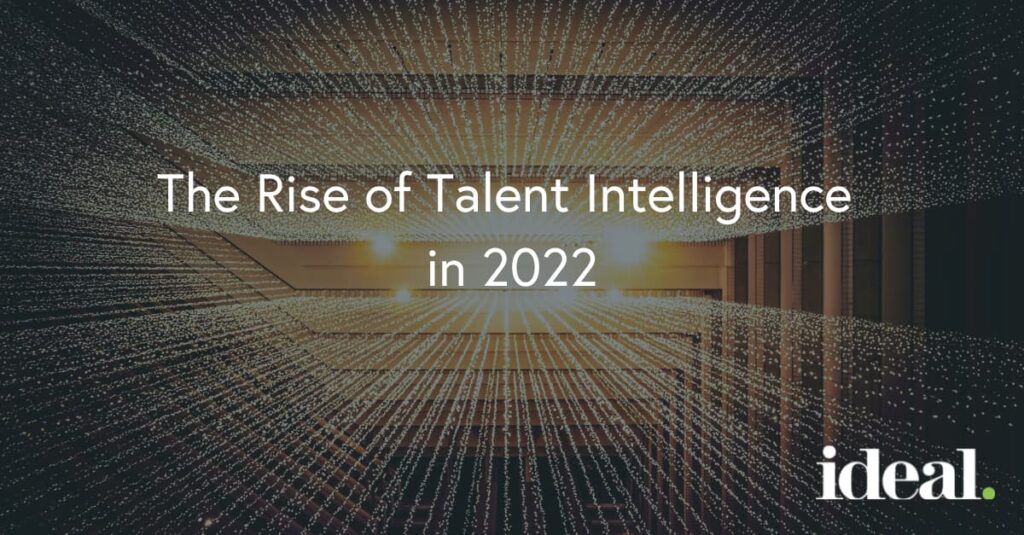
The importance of talent intelligence has grown more than ever in response to how COVID-19 has changed HR technology. As global organizations race to add new digital technologies to their stack, CHROs and HR teams are increasingly indispensable as the leader of the employee experience. These technologies are imperative for how your talent strategy will remain competitive in the changing world in response to COVID-19.
In partnership with Talent Tech Labs, Ideal has participated in a trends report looking ahead at the future of talent intelligence. Read more in An Excerpt from The Rise of Talent Intelligence Today.
How Talent Intelligence Impacts the Whole Organization
Managing talent may fall under the umbrella of Human Resources, but its impact is felt by the entire organization. Hiring accuracy, decreasing time-to-fill, and retaining talent are integral to an organization’s bottom line and speaks to the overall health of a company.
When leveraging Talent Intelligence, you are using a data-backed approach for engaging with your workforce, across the employee lifecycle. Workforce strategies need to be aligned with business strategies to create a cohesive ecosystem.
With the power of machine learning, automated processes, and the ability to visibly connect data points, recruiters can evaluate data on a granular level for faster and more accurate hires. Global organizations must adopt and adapt to new technologies at a greater speed than ever before if only to keep up with their competitors.

How organizations are using talent intelligence to drive value
Talent intelligence gives enterprise organizations a competitive advantage for every aspect of their talent strategy. From attracting to hiring, and developing and retaining talent, your people are your organization’s most valuable asset. HR leaders can better predict your talent acquisition and development needs and make strategic decisions at an enterprise level.
Anticipate your hiring needs
Gain better visibility into the strengths of your total talent pool, as well as notable gaps in skills.
Identify internal opportunities
Map out your talent strategy in advance with succession plans, prospective teams for upcoming projects, and potential leaders to develop.
Reduce talent acquisition costs
Optimize your spending across each stage of the recruitment process, from pinpointing the channels with the most successful candidate leads to reducing your time-to-fill for each opening.
Reduce turnover
Better understand why people leave your organization and why others stay. Was it related to the role itself or company culture? Employee churn and replacement is expensive, especially for replacing specialized positions.
Measure diversity, equity, and inclusion across your organization
Diagnose talent patterns across your organizations. Objectively measure workforce demographics to create actionable insights into the future success of your organization. Talent intelligence tools can also identify inequity in everything from payroll to promotion opportunities to help create actionable policy changes.
AI’s Direction in 2022 and Beyond
The pandemic has forced many people to re-evaluate their work and the war on talent has become increasingly competitive, with millions of people quitting in The Great Resignation due to burnout, return to office, and work-related stresses.
Talent management data can provide managers with an objective environment to better understand their workforce’s intersecting demographics. By leveraging their own insights, HR leaders are developing efficient and fair policies for shortlisting new candidates, upskilling, career pathing, as well as fostering diversity, equity, and inclusion —all important facets of the global organization.
Top organizations are built with a diverse group of capable and talented people. With the support of artificial intelligence, your management team will have the tools to make more accurate, efficient, and fair talent decisions.
Where your candidate and employee experience requires a new level of detail, talent intelligence can illuminate the areas that your organization is vulnerable to losing top talent and improving upon the entire employee experience.
Are you ready to digitally transform your understanding of your workforce? Look forward to the direction Talent Intelligence is moving and learn more about the type of data talent acquisition leaders are leveraging to transform their organizations.
About Talent Tech Labs
Talent Tech Labs provides research and advisory services to help HR and staffing leaders navigate the market and create powerful talent acquisition technology stacks.